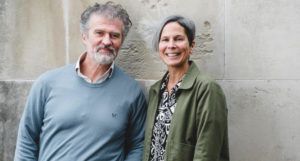Recommendations for new generation of Brain Health Services, to help prevent dementia

A European Task Force involving the University of Exeter has created an evidence-based road map for Brain Health Services, new services designed to support people in keeping their brains healthy and reducing their risk of developing dementia.
Published in the Lancet Regional Health – Europe, the recommendations provide a protocol with four pillars to enable these new services to identify, communicate and reduce dementia risk, and also to reinforce or enhance memory.
Conventional memory clinics focus on diagnosing whether someone who is already showing symptoms has dementia, in order to inform appropriate treatment and care at a relatively late stage. However, improvements in prevention strategies now present an opportunity for a brand new type of service, called Brain Health Services. These will identify people who are at high risk of developing dementia in the future, and support them to reduce this risk. Some countries are already setting up these services, but no clear guidance exists on how they should operate.
Now, researchers from 28 institutions have come together in a consortium led by the University of Geneva, to review global evidence and create a gold standard road map of how these new services can enhance brain health. Dr Janice Ranson and Professor David Llewellyn from the University of Exeter Medical School led on the development of the recommendations relating to risk reduction and risk profiling.
Dr Janice Ranson, of the University of Exeter Medical School, said: “Brain Health Services represent the next stage in the development of cutting-edge clinical services to preserve brain health and prevent dementia. We are making considerable progress in our mission to reduce patients’ dementia risk.”
Professor David Llewellyn, of the University of Exeter Medical School, said: “These international Task Force recommendations represent an important step forwards in our fight to combat dementia. Indeed, we now recognise that this fight begins many decades earlier than anyone previously realised. Brain health Services provide us with a fundamentally new approach to help protect our ageing brains at a much earlier stage.”
Professor Giovannio B Frisoni, Full Professor of Clinical Neuroscience at the UNIGE Faculty of Medicine and Director of the HUG Memory Centre Geneva University Hospital: ‘We based this protocol on the experience of all the members of the task force. Some of the recommended interventions are ready to be applied or are already applied. Others are still under development,’’
The taskforce has identified four pillars for the deployment of Brain Health Services:
- Risk assessment: The risk factors for Alzheimer’s disease or related disorders and their weight have been grouped together in an evaluation grid. These include factors associated with genes, such as APOE4, or those linked to lifestyle or conditions, such as hypertension, diabetes, alcohol consumption, social isolation, obesity, hearing loss, depression or head trauma.
- Risk communication: Effective risk communication is crucial to help patients understand their risk of dementia in an accurate and meaningful way without causing unnecessary distress. A series of recommendations based on the patient’s personality and background make it possible to choose the best tools for presenting the situation to the patient in a comprehensible manner.
- Risk reduction: Drug and non-drug interventions are proposed for risk reduction. These range from lifestyle improvements to cognitive training and the administration of newly developed anti-amyloid drugs, if these become available clinically.
- Cognitive enhancement: Different types of memory can be reinforced or stimulated through paper-based exercises or computer games. Non-invasive brain stimulation, such as transcranial electrical or magnetic stimulation, may also be important to activate synapses in key brain regions to improve memory.
These four pillars detailed in the Lancet Regional Health – Europe article will enable newly developed Brain Health Services to reach out to the segment of the population whose memory is still functioning well and who wish to preserve or improve it. This goes well beyond what current diagnostic memory clinics offer.
The article is entitled ‘Dementia prevention in memory clinics: Recommendations from the European Task Force for Brain Health Services’



